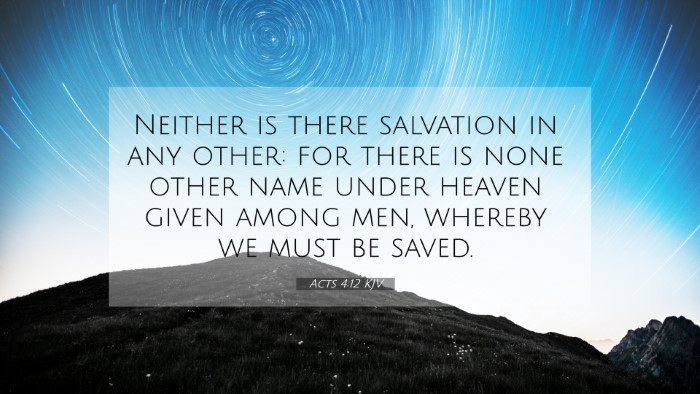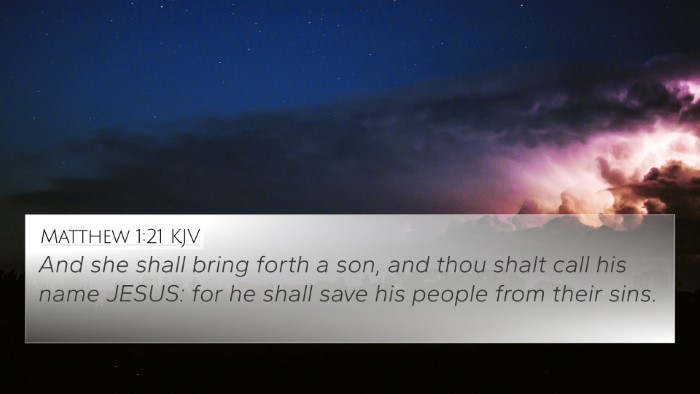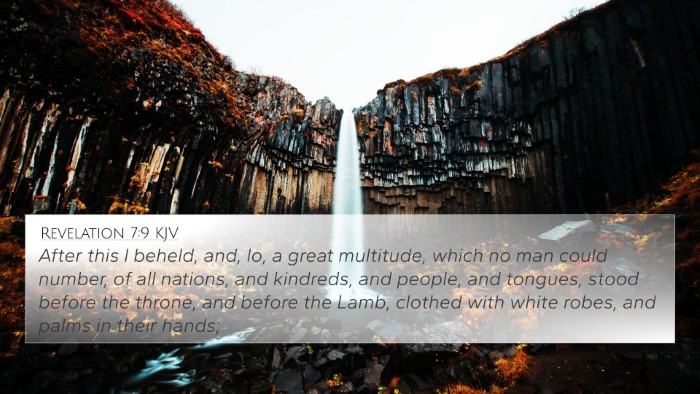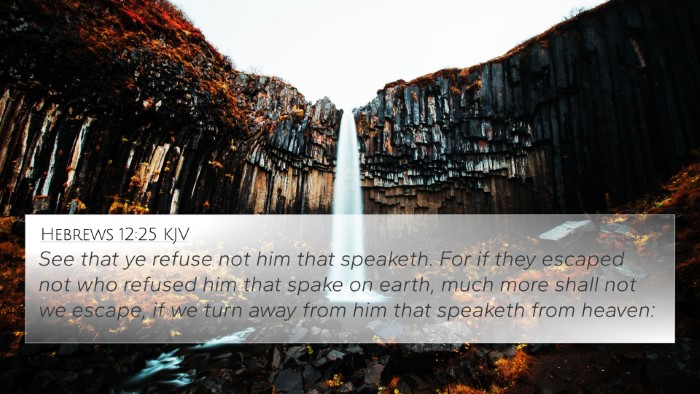Understanding Acts 4:12
Acts 4:12 states, "Neither is there salvation in any other: for there is none other name under heaven given among men, whereby we must be saved."
This verse emphasizes the exclusivity of salvation through Jesus Christ, asserting that no alternate means or entities can offer redemption for mankind. Below is a combined analysis of its meaning and implications drawn from public domain commentaries by Matthew Henry, Albert Barnes, and Adam Clarke.
Verse Summary
In this passage, the apostles Peter and John are addressing the Sanhedrin, the Jewish ruling council. They declare the truth that salvation is solely through Jesus Christ. This declaration highlights several crucial theological points:
- Exclusivity of Christ: The emphasis is on the singular name of Jesus, which represents the one true path to salvation.
- Universal Availability: While salvation is exclusive to Jesus, it is available to all who believe, indicated by the term "among men."
- Necessity of Salvation: The use of "must" underscores the imperative nature of salvation for human beings.
Theological Insights
This verse drives home some vital theological concepts:
- Salvation: According to Matthew Henry, salvation signifies not just deliverance from sin but also the restoration of the relationship between God and man.
- Authority of Christ: Albert Barnes notes that the power of Jesus' name is central to Christian faith and practice, and believers are encouraged to invoke this name with confidence.
- Faith Requirement: Adam Clarke emphasizes that faith in Jesus is the prerequisite for receiving salvation, calling attention to the need for acknowledgment of Christ's authority.
Cross-References for Acts 4:12
To further understand Acts 4:12, several Bible verses that reinforce its message can be examined:
- John 14:6: "Jesus said unto him, I am the way, the truth, and the life: no man cometh unto the Father, but by me."
- Romans 10:9-10: "That if thou shalt confess with thy mouth the Lord Jesus, and shalt believe in thine heart that God hath raised him from the dead, thou shalt be saved."
- Ephesians 2:8-9: "For by grace are ye saved through faith; and that not of yourselves: it is the gift of God: Not of works, lest any man should boast."
- Philippians 2:9-11: "Wherefore God also hath highly exalted him, and given him a name which is above every name: That at the name of Jesus every knee should bow."
- 1 Timothy 2:5: "For there is one God, and one mediator between God and men, the man Christ Jesus."
- Acts 10:43: "To him give all the prophets witness, that through his name whosoever believeth in him shall receive remission of sins."
- John 3:36: "He that believeth on the Son hath everlasting life: and he that believeth not the Son shall not see life; but the wrath of God abideth on him."
Connections to Other Scriptures
Acts 4:12 serves as a foundational aspect in understanding the theme of salvation throughout the entire Bible, particularly between the Old and New Testaments. Here are a few thematic connections that shine a light on this critical doctrine:
- Old Testament Prophecies: Isaiah 43:11 proclaims, "I, even I, am the LORD; and beside me there is no savior." This foreshadows the New Testament realization of Christ as the Savior.
- Covenantal Fulfillment: In John 8:24, Jesus states, "For if ye believe not that I am he, ye shall die in your sins." This connects to the necessity of recognizing Jesus as the sole mediator for salvation.
- Rejection and Acceptance: The discourse in Acts 4:12 following the healing of a lame man signifies the contrast between the Pharisees' rejection of Jesus and the early church's belief in His name.
Comparative Bible Verse Analysis
When comparing Acts 4:12 with other verses, it becomes clear that this concept of exclusive salvation through Christ is a consistent teaching across the New Testament. For instance:
- Hebrews 7:25: "Wherefore he is able also to save them to the uttermost that come unto God by him, seeing he ever liveth to make intercession for them." This illustrates the ongoing advocacy of Christ as central to salvation.
- Matthew 28:18-20: The Great Commission reinforces the call for believers to spread the message of salvation through Jesus to all nations, underlining its significance and urgency.
Tools for Bible Cross-Referencing
To explore cross-references, believers can utilize a variety of resources. These include:
- Bible Concordance: These reference tools help locate keywords and phrases across scripture, providing insights into thematic connections and cross-referencing pertinent verses.
- Bible Cross-Reference Guide: Many study Bibles come equipped with notes that suggest related verses, aiding in comprehensive study and deeper understanding.
- Cross-Reference Bible Study Methods: Techniques such as topical Bible studies and thematic analysis help facilitate thorough exploration of scripture connections.
Conclusion
Acts 4:12 stands as a powerful proclamation of Christian doctrine, affirming the necessity of faith in Jesus Christ for salvation. Its connections to other Bible verses enhance our understanding of its implications and fundamental truths. Through cross-referencing passages and utilizing valuable Bible tools, believers can explore the intricacies of their faith, deepening their relationship with God through Jesus, the sole means of salvation.




















